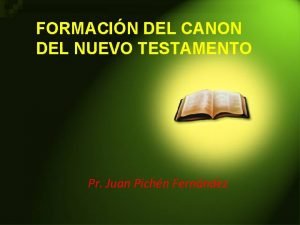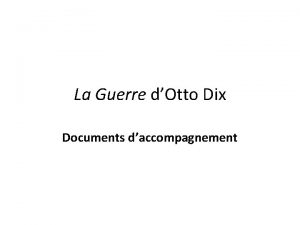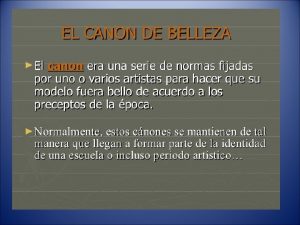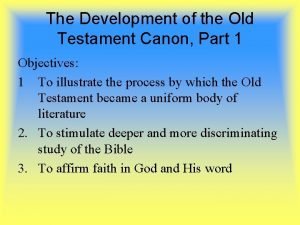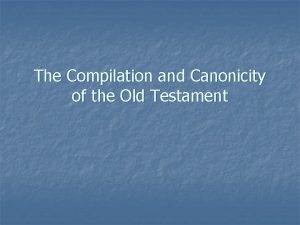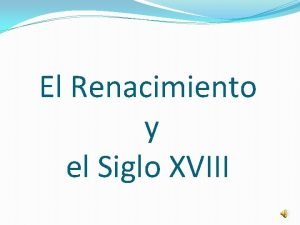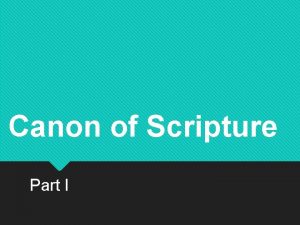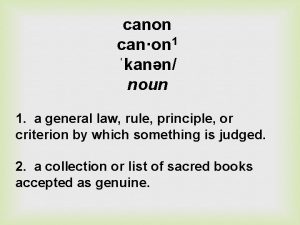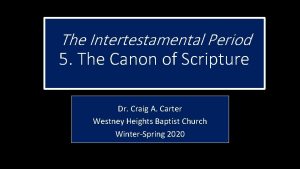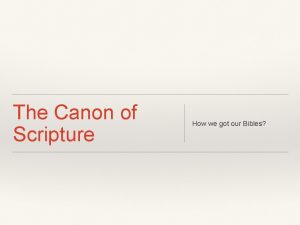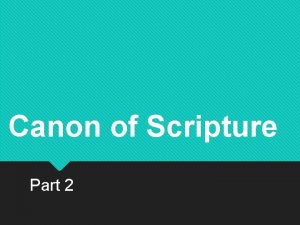The Canon of Scripture The Canon of Scripture















- Slides: 15


The Canon of Scripture

The Canon of Scripture • The term “canon” has its origin in a family of Semitic words that referred to a reed or a rod. • In ancient times a straight rod might be marked for the purpose of measuring. • The word came to refer to a series of marks used for measurement. • The “Biblical Canon” is the list of books which should be considered the authoritative standard by which faith and conduct is measured.

The Canon of Scripture • Who decided what books belong in this authoritative list? • How do we know that we have all of the books we are supposed to have? • The Catholic Church has addressed this problem through church councils. • Protestants claim the Holy Spirit will directly assure Christians of every age that the canon of Scripture is accurate.

The Canon of Scripture • God has determined which books belong in the Bible through His inspiration of the Scriptures. • Books were accepted based on their inspiration.

Collection and Dispersion of the New Testament • The writings of the apostles were originally intended to be circulated. • “To the churches of Galatia” (Gal. 1: 2). • “To the church of God which is at Corinth, with all the saints who are in all Achaia” (2 Cor. 1: 1). • Colossians was to be shared (Col. 4: 16). • By the writing of 2 Peter (approximately 64 AD), the letters of Paul were spoken of collectively, and were on par with the Old Testament Scriptures (2 Pet. 3: 15 -16).


Clement of Rome Wrote a letter to the church at Corinth around 95 AD. In the letter he quoted from at least one gospel, Romans, 1 Corinthians, Galatians, Ephesians, Philippians, Hebrews, possibly John, Acts, James and 1 Peter.

Ignatius of Antioch Wrote several letters on his way to martyrdom in 107 AD. In his letters he quotes from Matthew, John, Romans, 1 Corinthians, Galatians, Ephesians, Philippians, Colossians, 1 Thessalonians, possibly Luke, Hebrews and 1 Peter.

Polycarp of Smyrna Wrote a letter to the church at Philippi. In his letter he quotes Matthew, Luke, Romans, 1 Corinthians, Galatians, Ephesians, Philippians, 2 Thessalonians, 1 and 2 Timothy, Hebrews, 1 Peter, 1 John and possibly John, Acts, 2 Corinthians, Colossians and 2 John.


The Apocrypha • Originated in the period between the Old and New Testaments. • Jesus never quoted any of these books. • No New Testament writer quotes any of these books. • They contain teaching that is unbiblical or heretical.

The Pseudepigrapha • A collection of books containing various forms of literature, using names of famous people for the titles of the books. The real authors are unknown. • These books were written as propaganda for heretical sects, and were attributed to known people to give them credibility. • They contain doctrinal error, fanciful tales, and historical inaccuracies (proving they are not of true divine inspiration).


 Kyste hydatique du poumon radio
Kyste hydatique du poumon radio Canon
Canon Canon lisipo
Canon lisipo Canon rc-701
Canon rc-701 Canons of journalism.
Canons of journalism. Que es el canon del nuevo testamento
Que es el canon del nuevo testamento Canon law latin
Canon law latin Canon eagles lyrics
Canon eagles lyrics Como se formo el canon del antiguo testamento
Como se formo el canon del antiguo testamento Joueurs de skat
Joueurs de skat Canon antropométrico
Canon antropométrico Canon 8714574593814
Canon 8714574593814 Ot canon
Ot canon Canon de belleza actual
Canon de belleza actual Old testament canon timeline
Old testament canon timeline Renacimiento siglos de oro y neoclasicismo
Renacimiento siglos de oro y neoclasicismo





